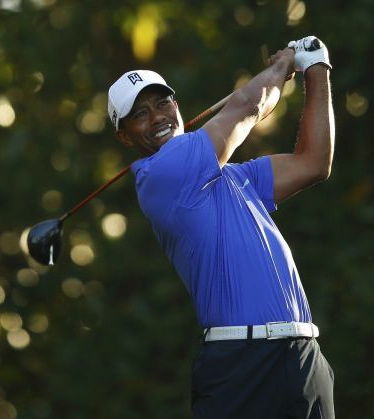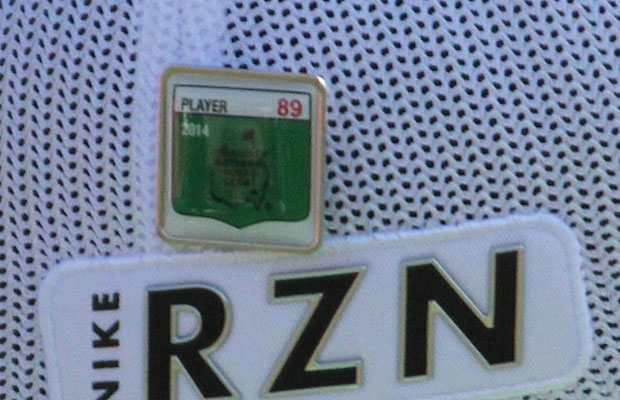Opinion & Analysis
Five reasons: Tiger should not play the weekend

Irony is working overtime this Masters weekend. Tianlang Guan was assessed a one-stroke penalty for slow play and the social media world exploded with cries of jingoism and favoritism.
Fortunately for Guan, he took the high road and indicated that he understood and would accept the penalty without complaint. It helped that he made the cut by one slim stroke. The Guan incident, since he is quite distant from the leaders, will drip into the background, thanks to another rules incident involving a competitor of a much higher profile.
Tiger Woods clanked his third shot on the 15th hole off the flagstick and into the pond fronting the green in Round 2. He then appeared to retreat to the point of the third stroke, drop a ball and play on, making bogey.
During the post-round press conference, rule 33-5 came into play, because Woods told ESPN’s Tom Rinaldi that he intentionally had dropped his ball two yards behind the point of his third shot. That drop should have resulted in a penalty that Woods did not account for in his score, which means he signed an incorrect scorecard that should have disqualified him from the tournament.
Instead of disqualification, the Masters competition committee invoked a revision to rule 33-7, which gave Woods a two-shot penalty instead. This decision has not sat well with golf pundits and aficionados, who wondered why the world’s No. 1-ranked player would get off so easily.
Tiger has teed it up in Round 3 of the Masters, but here are five reasons why he is making a huge mistake.
No. 1: His reputation is at stake
Tiger’s personal difficulties sullied his on-course reputation and he has spent the last several years rebuilding his golf game. Had he disqualified himself in the spirit of personal integrity and karma, he would taken great strides to improve his reputation with sponsors and fans.
No. 2: Eliminate a perception of favoritism
Dustin Johnson (2010 PGA Championship) and Tianlang Guan (2013 Masters), among others, were assessed controversial penalties in major championships. They accepted the rulings and moved on.
Despite the fact that Tiger is adhering to the letter of the law and accepting the ruling as handed down by the Master Tournament Committee, the integrity of the game and its tournaments is exposed for debate and attack to the world. Is some sort of collusion at play to keep the most compelling figure in golf on golf’s most recognizable stage? We can’t be sure, but withdrawing would eliminate all shred of doubt.
No. 3: It’s tainted
If Tiger were to win the Masters this week, it would be tainted — plain and simple. Tiger should have known where to drop. No matter what he does over the next 36 holes, people will contrast this moment with Bobby Jones’ famous, “You might as well praise a man for not robbing a bank” episode when he called a one-stroke penalty on himself for a moving ball that no one but he saw move.
No. 4: Jack Nicklaus’ record
Tiger’s motivation and impetus for greatness has always been Jack Nicklaus’ major championship record. Tiger won six amateur USGA championships (way more than Nicklaus) and now holds 14 professional major titles, second only to Nicklaus’ 18.
Imagine this scenario: Tiger storms back from five shots down to win the 2013 Masters, which serves as a springboard to him eclipsing the 18 titles for most professional major championship victories in a career . . . but he only eclipses the victory tally by one? Will anyone recognize him as the greatest major champion of all time?
No. 5: It’s nothing personal
Debatable? Yes. Revocable? No. Just as Tiger’s disqualification should not be. Tiger broke a transparent rule, one with no room for interpretation. Professional golfers are disqualified from events on a regular basis on the PGA Tour. Even the world’s No. 1 golfer can make a mistake, and like every other professional, he should be held accountable. It’s nothing personal.
Click here to read a different take by GolfWRX Featured Writer Grant Shafranski — “Blame The Rules Committee, Not Tiger.”
Opinion & Analysis
The 2 primary challenges golf equipment companies face

As the editor-in-chief of this website and an observer of the GolfWRX forums and other online golf equipment discourse for over a decade, I’m pretty well attuned to the grunts and grumbles of a significant portion of the golf equipment purchasing spectrum. And before you accuse me of lording above all in some digital ivory tower, I’d like to offer that I worked at golf courses (public and private) for years prior to picking up my pen, so I’m well-versed in the non-degenerate golf equipment consumers out there. I touched (green)grass (retail)!
Complaints about the ills of and related to the OEMs usually follow some version of: Product cycles are too short for real innovation, tour equipment isn’t the same as retail (which is largely not true, by the way), too much is invested in marketing and not enough in R&D, top staffer X hasn’t even put the new driver in play, so it’s obviously not superior to the previous generation, prices are too high, and on and on.
Without digging into the merits of any of these claims, which I believe are mostly red herrings, I’d like to bring into view of our rangefinder what I believe to be the two primary difficulties golf equipment companies face.
One: As Terry Koehler, back when he was the CEO of Ben Hogan, told me at the time of the Ft Worth irons launch, if you can’t regularly hit the golf ball in a coin-sized area in the middle of the face, there’s not a ton that iron technology can do for you. Now, this is less true now with respect to irons than when he said it, and is less and less true by degrees as the clubs get larger (utilities, fairways, hybrids, drivers), but there remains a great deal of golf equipment truth in that statement. Think about it — which is to say, in TL;DR fashion, get lessons from a qualified instructor who will teach you about the fundamentals of repeatable impact and how the golf swing works, not just offer band-aid fixes. If you can’t repeatably deliver the golf club to the golf ball in something resembling the manner it was designed for, how can you expect to be getting the most out of the club — put another way, the maximum value from your investment?
Similarly, game improvement equipment can only improve your game if you game it. In other words, get fit for the clubs you ought to be playing rather than filling the bag with the ones you wish you could hit or used to be able to hit. Of course, don’t do this if you don’t care about performance and just want to hit a forged blade while playing off an 18 handicap. That’s absolutely fine. There were plenty of members in clubs back in the day playing Hogan Apex or Mizuno MP-32 irons who had no business doing so from a ballstriking standpoint, but they enjoyed their look, feel, and complementary qualities to their Gatsby hats and cashmere sweaters. Do what brings you a measure of joy in this maddening game.
Now, the second issue. This is not a plea for non-conforming equipment; rather, it is a statement of fact. USGA/R&A limits on every facet of golf equipment are detrimental to golf equipment manufacturers. Sure, you know this, but do you think about it as it applies to almost every element of equipment? A 500cc driver would be inherently more forgiving than a 460cc, as one with a COR measurement in excess of 0.83. 50-inch shafts. Box grooves. And on and on.
Would fewer regulations be objectively bad for the game? Would this erode its soul? Fortunately, that’s beside the point of this exercise, which is merely to point out the facts. The fact, in this case, is that equipment restrictions and regulations are the slaughterbench of an abundance of innovation in the golf equipment space. Is this for the best? Well, now I’ve asked the question twice and might as well give a partial response, I guess my answer to that would be, “It depends on what type of golf you’re playing and who you’re playing it with.”
For my part, I don’t mind embarrassing myself with vintage blades and persimmons chasing after the quasi-spiritual elevation of a well-struck shot, but that’s just me. Plenty of folks don’t give a damn if their grooves are conforming. Plenty of folks think the folks in Liberty Corner ought to add a prison to the museum for such offences. And those are just a few of the considerations for the amateur game — which doesn’t get inside the gallery ropes of the pro game…
Different strokes in the game of golf, in my humble opinion.
Anyway, I believe equipment company engineers are genuinely trying to build better equipment year over year. The marketing departments are trying to find ways to make this equipment appeal to the broadest segment of the golf market possible. All of this against (1) the backdrop of — at least for now — firm product cycles. And golfers who, with their ~15 average handicap (men), for the most part, are not striping the golf ball like Tiger in his prime and seem to have less and less time year over year to practice and improve. (2) Regulations that massively restrict what they’re able to do…
That’s the landscape as I see it and the real headwinds for golf equipment companies. No doubt, there’s more I haven’t considered, but I think the previous is a better — and better faith — point of departure when formulating any serious commentary on the golf equipment world than some of the more cynical and conspiratorial takes I hear.
Agree? Disagree? Think I’m worthy of an Adam Hadwin-esque security guard tackle? Let me know in the comments.
@golfoncbs The infamous Adam Hadwin tackle ? #golf #fyp #canada #pgatour #adamhadwin ? Ghibli-style nostalgic waltz – MaSssuguMusic
Podcasts
Fore Love of Golf: Introducing a new club concept

Episode #16 brings us Cliff McKinney. Cliff is the founder of Old Charlie Golf Club, a new club, and concept, to be built in the Florida panhandle. The model is quite interesting and aims to make great, private golf more affordable. We hope you enjoy the show!
Opinion & Analysis
On Scottie Scheffler wondering ‘What’s the point of winning?’

Last week, I came across a reel from BBC Sport on Instagram featuring Scottie Scheffler speaking to the media ahead of The Open at Royal Portrush. In it, he shared that he often wonders what the point is of wanting to win tournaments so badly — especially when he knows, deep down, that it doesn’t lead to a truly fulfilling life.
View this post on Instagram
“Is it great to be able to win tournaments and to accomplish the things I have in the game of golf? Yeah, it brings tears to my eyes just to think about it because I’ve literally worked my entire life to be good at this sport,” Scheffler said. “To have that kind of sense of accomplishment, I think, is a pretty cool feeling. To get to live out your dreams is very special, but at the end of the day, I’m not out here to inspire the next generation of golfers. I’m not out here to inspire someone to be the best player in the world, because what’s the point?”
Ironically — or perhaps perfectly — he went on to win the claret jug.
That question — what’s the point of winning? — cuts straight to the heart of the human journey.
As someone who’s spent over two decades in the trenches of professional golf, and in deep study of the mental, emotional, and spiritual dimensions of the game, I see Scottie’s inner conflict as a sign of soul evolution in motion.
I came to golf late. I wasn’t a junior standout or college All-American. At 27, I left a steady corporate job to see if I could be on the PGA Tour starting as a 14-handicap, average-length hitter. Over the years, my journey has been defined less by trophies and more by the relentless effort to navigate the deeply inequitable and gated system of professional golf — an effort that ultimately turned inward and helped me evolve as both a golfer and a person.
One perspective that helped me make sense of this inner dissonance around competition and our culture’s tendency to overvalue winning is the idea of soul evolution.
The University of Virginia’s Division of Perceptual Studies has done extensive research on reincarnation, and Netflix’s Surviving Death (Episode 6) explores the topic, too. Whether you take it literally or metaphorically, the idea that we’re on a long arc of growth — from beginner to sage elder — offers a profound perspective.
If you accept the premise literally, then terms like “young soul” and “old soul” start to hold meaning. However, even if we set the word “soul” aside, it’s easy to see that different levels of life experience produce different worldviews.
Newer souls — or people in earlier stages of their development — may be curious and kind but still lack discernment or depth. There is a naivety, and they don’t yet question as deeply, tending to see things in black and white, partly because certainty feels safer than confronting the unknown.
As we gain more experience, we begin to experiment. We test limits. We chase extreme external goals — sometimes at the expense of health, relationships, or inner peace — still operating from hunger, ambition, and the fragility of the ego.
It’s a necessary stage, but often a turbulent and unfulfilling one.
David Duval fell off the map after reaching World No. 1. Bubba Watson had his own “Is this it?” moment with his caddie, Ted Scott, after winning the Masters.
In Aaron Rodgers: Enigma, reflecting on his 2011 Super Bowl win, Rodgers said:
“Now I’ve accomplished the only thing that I really, really wanted to do in my life. Now what? I was like, ‘Did I aim at the wrong thing? Did I spend too much time thinking about stuff that ultimately doesn’t give you true happiness?’”
Jim Carrey once said, “I think everybody should get rich and famous and do everything they ever dreamed of so they can see that it’s not the answer.”
Eventually, though, something shifts.
We begin to see in shades of gray. Winning, dominating, accumulating—these pursuits lose their shine. The rewards feel more fleeting. Living in a constant state of fight-or-flight makes us feel alive, yes, but not happy and joyful.
Compassion begins to replace ambition. Love, presence, and gratitude become more fulfilling than status, profits, or trophies. We crave balance over burnout. Collaboration over competition. Meaning over metrics.
Interestingly, if we zoom out, we can apply this same model to nations and cultures. Countries, like people, have a collective “soul stage” made up of the individuals within them.
Take the United States, for example. I’d place it as a mid-level soul: highly competitive and deeply driven, but still learning emotional maturity. Still uncomfortable with nuance. Still believing that more is always better. Despite its global wins, the U.S. currently ranks just 23rd in happiness (as of 2025). You might liken it to a gifted teenager—bold, eager, and ambitious, but angsty and still figuring out how to live well and in balance. As much as a parent wants to protect their child, sometimes the child has to make their own mistakes to truly grow.
So when Scottie Scheffler wonders what the point of winning is, I don’t see someone losing strength.
I see someone evolving.
He’s beginning to look beyond the leaderboard. Beyond metrics of success that carry a lower vibration. And yet, in a poetic twist, Scheffler did go on to win The Open. But that only reinforces the point: even at the pinnacle, the question remains. And if more of us in the golf and sports world — and in U.S. culture at large — started asking similar questions, we might discover that the more meaningful trophy isn’t about accumulating or beating others at all costs.
It’s about awakening and evolving to something more than winning could ever promise.

















edward davison jr
Apr 30, 2013 at 10:37 am
In two cases — Brian Davis ticking a reed in a waste area at Hilton Head and Ian Poulter’s coin moving slightly when he dropped his ball on the green during a playoff — the players called the penalty on themselves.
Dustin Johnson grounded his club in a bunker he didn’t know he was in at the PGA Championship, and the PGA of America notified him of the two-stroke penalty before he signed his card, knocking him out of a playoff. Juli Inkster also was disqualified for swinging a weighted club during a long wait on the tee. That infraction was called in by a viewer
C Nas
Apr 19, 2013 at 6:40 am
I don’t think Tiger should have been DQ’d. The objective in any sports’ rulings is to get the call “right”. The two stroke penalty was the proper ruling for his improper drop. That’s a severe penalty. It came late (after Tiger’s TV interview) but they got it right. Initially they ruled no violation, that’s why Tiger had already signed his card. And as far as signing an incorrect card, that rule is archaic and that’s why it has been modified. The old guard cries that, “we’ve played under that rule for eons”. Hey, they used to play with hickory shafts and persimmons. Times change, rules change. What about Scott’s long putter? That may be on the way out, but it won’t mar his victory; he’s using it under the current rules. Things change. With today’s technology, everyone knows what everyone did “ON THE COURSE”. What you do in a tent after your round shouldn’t matter much anymore. Let the officials keep scores. There’s got to be a way!
Dave Petersen
Apr 15, 2013 at 11:23 pm
So, was Tiger’s drop within the length of Scott’s putter from his original location?
mike worgul
Apr 14, 2013 at 9:34 pm
the question i have is why they waited till sat morning to talk to tiger when they had evidence after the espn interview that he did in fact violate the as near as possible previous spot rule. i mean he did the interview right after he finished the round and im sure some official at augusta had listened to it. but ridley went out to eat with his family and more time passed.for a tournament that prides itself on getting everything right i believe in this case they did everything wrong.i wonder how palmer,nicklaus,player,and the many players really feel about this issue.all you here now is bloviating
Ronald Montesano
Apr 14, 2013 at 12:12 pm
Thank you for all these comments and interpretations. I am encouraged by the exchange of opinions and ideas.
Adam
Apr 14, 2013 at 11:37 am
The real issue here is that it’s a poorly written rule. “The nearest point”? How vague can you be? How many people look at that divot and where he played the drop from and think there’s absolutely nothing wrong with it? Almost everyone I’m sure. Should he have tried to drop it directly in his divot? They need to ammend the rule to within a club length of the spot, same cut of grass, and no closer to the hole. That makes perfect sense and is not gaining any advantage. To say Tiger was going to hit the exact same shot and moving, essentially, one club length behind his divot gives him an advantage is ridiculous.
The call in rule is also insanely unfair. Tiger is at a DISADVANTAGE since he gets by far the most air time. Tiger does not need to WD for the integrity of the game, he’s the first example of a positive rule change to protect players from an already outdated scorecard signing rule.
Rob
Apr 14, 2013 at 3:49 pm
Tiger misspoke when he said he dropped a couple of yards behind his previous shot. Video review showed the distance to be closer to a foot. “As near as possible” is very vague. The main thing it seems is not to end up closer to the hole. Branded Chamblee and Nick Price are card carrying Tiger haters and acted like buffoons yesterday. The rules committee reviewed the video and found nothing wrong Friday so there should have been no penalty and that should have been the end of it.
There’s a concerted effort to derail Tiger’s goal of eclipsing Jack’s 18 majors so this BS doesn’t surprise me.
rj
Apr 17, 2013 at 1:01 pm
I agree with you adam. I dont think I have ever seen anybody drop the ball in their divot. the rules committee needs to modify this rule instead of worrying about wedge grooves and putter lengths.
J
Apr 14, 2013 at 10:59 am
It’s an invitational Tournament. Plain and simple. ANGC decides the rules, enforces the rules and they spoke. It’s not against the spirit of the rules as the rules have been modified due to self important a-holes sitting around trying to be included in something that has nothing to do with them.
Tiger reported the drop. The officials made a decision and later changed their mind.
Sounds like Tiger tried to get a proper ruling before signing his card, was given a ruling that was later changed… I’m unsure why all the detractors in this situation are neglecting that fact.
It’s simple, and those calling for his withdrawal are nothing more than vultures who look for yet another reason to pile on Tiger Woods. It’s amazing the amount of emotion devoted to wishing ill-will of a stranger. Just because you see him on television doesn’t mean you know him. The rules were changed to allow for situations like this… Or does that escape everyone’s attention?
Soooo…. He broke a rule and was punished. The punishment was handed out by the people in charge. Everyone calling for further, self imposed punishment…. Get over it. You don’t know Tiger Woods… Stop letting a stranger inspire emotion, especially negative emotion, and you might find a little more enjoyment out of watching history.
john
Apr 14, 2013 at 6:35 am
the only reason tiger signed an incorrect scorecard is because the committee said his drop was fine and the only reason they changed their minds is because Tiger admitted on ESPN that he dropped it farther to give him an advantage which made the drop illegal in the committees mind. however tiger had already signed his scorecard at that time and did not think he signed an incorrect scorecard at the time.
disqualification is warranted for signing an incorrect scorecard but no one has ever been disqualified for an improper drop.
you can argue that tiger should know the rules and the committee should not have given tiger the ok but honestly if tiger knew the rules and he knew he was on national television why would he try to get away with it in front of millions of people. tigers behavior did not warrant a disqualification only a 2 stroke penalty which is what happened. i dont think there is any special treatment going on and i also dont know any other sport where a viewer can call in and influence the officials decision and also where an ESPN interview influences a committees decision. there is something at fault here but its not tiger.
whids
Apr 14, 2013 at 12:14 am
The rules of golf are crystal clear when you hit a ball into lateral water hazard. Tiger made an incorrect drop and should have been informed of this by the Masters Rules Committee that reviewed the drop several times but, saw no wrong doing. The Rules Committee screwed up and so did Tiger, Under the current (and revised rules) Tiger was given the correct penalty. He has no reason to DQ himself, he is following the rules that are in place. If this was 3 years ago, Tiger would have been DQ’d and he would have been fine with it because those are the rules.
Ronald Montesano
Apr 13, 2013 at 10:09 pm
Jerry…I don’t share your interpretations and hopes, but I’m glad that you took the time to comment.
Letter of the law
Apr 14, 2013 at 9:17 am
The rules were administered to Tiger correctly. Plain and simple. The rule of 10 years ago does not apply. Those suggesting Tiger should withdraw are suggesting he not follow the rules but go above and beyond what the rule book requires and showing their lack of rules knowledge. Brandle Chamblee made a fool of himself yesterday saying, “This will follow him around for the rest of his career”. Sounds like a bitter Tiger hater.
Evan
Apr 14, 2013 at 2:11 pm
Many of the commentators/ pros seemed to only have part of the story or only listened to the anti-Tiger viewpoint. There seems to be many Tiger haters on or around the tour these days. I believe any other player would have been penalized the same way and I believe Tiger’s negative perception is one of the only reasons this topic has escalated.
So it’s ok to penalize Tiger to the letter of the law and even call for him to further penalize himself, yet everyone wants to give the 14 year old a pass for violating timing rules multiple times on the back nine, possibly not only giving him an advantage but possibly throwing off the timing of players behind him. Seems like a popularity contest in the public eye to me.
Steve
Apr 14, 2013 at 3:46 pm
Exactly. If it was anybody but Tiger, (A) no one would care, or (B) most of these people would be in favor of the decision.
TWShoot67
Apr 14, 2013 at 5:50 pm
Hit the nail on the head. If this happened to anyone else this story would have never been written. RONALD MONTESANO, go review the all of the Masters and see if you can find another infraction, and write with that same vigor. get real you sound like sour grapes and each time you try a new analogy you dig yourself further into the hateraid bowl!
Ronald Montesano
Apr 14, 2013 at 10:14 pm
Nope…no one but Tiger influenced Tiger. There were two other players in Guan’s threesome and one suspects they contributed to the slow play.
Ronald Montesano
Apr 13, 2013 at 10:09 pm
Blanco and Petty, at what point do we draw the line? The new interpretive revision basically lets cheaters and ignoramuses get away with whatever they desire. When I say to the police office, “ocifer, I didn’t mean to speed,” is the officer going to say “here’s your license, sir. No ticket today”?
It would have made a statement to the professional golf world that transgressors are held accountable. If Guan can get penalized when dozens of slower tour players get away with it, why can’t Tiger? Now, other golfers will use the “Tiger Non-Ruling” as precedent for getting away with … everything!
Steve
Apr 13, 2013 at 11:13 pm
Get away with whatever they desire? You’re acting like he didn’t get penalized… He took a 2 stroke penalty and moved on.
When I say to the police office, “ocifer, I didn’t mean to speed,” is the officer going to say “here’s your license, sir. No ticket today”?
Is he going to suspend your license for speeding? That’s be the same as a DQ. No, he’s going to give you a fine, which would be like a penalty stroke, not a DQ. Again, Tiger didn’t get off free like you are trying to make it seem like.
Steve
Apr 13, 2013 at 11:19 pm
That’d be the same* (dang autocorrect!)
Ronald Montesano
Apr 14, 2013 at 6:11 am
Correct, he didn’t get off free. In both cases (the hypothetical speeding and the actual golf event) the intensity of the offense does determine the severity of the penalty.
Speed far above the limit and you will lose your license, right? This was a case where Tiger (as many non-violent golfing transgressors before him) deserved to be penalized with a disqualification and got off with less.
It is shaping up to be a fine conclusion. I give Tiger even odds to win the tournament.
Jerry
Apr 13, 2013 at 7:48 pm
The rules comitee should not have been needed. Tiger and Lance are part of the same culture. Sad day for golf. Tiger needed to w/d on his own admission. Let him always be known as a cheater/loser in life with his buddies Barry and Lance and any other so called golf amateur who thinks he was ok to play today. The other pros were cowards to defend him. Like to hear from Arnie and Jack. Hopefully this leads to a continuation of no more majors like the Cubs.
petty
Apr 13, 2013 at 7:37 pm
There are millions of eyes watching him – you really think he intentionally tried to cheat and get away with it as well?
He made a mistake and was penalized 2 strokes – time to move on . . . .
Blanco
Apr 13, 2013 at 6:41 pm
I’ve watched the shot, the hoopla, the post hoopla, the analysis… It’s clear to me that TW felt he was within the rules at the time of the drop. It’s even more clear that despite your “tainted” moralizing, the rules of golf expressly forbid a DQ in this case. Despite your weak arguments, TW, like Guan, “took the high road” and admitted his mistake after conferring with officials.
If he wins, and I hope he does– there will be no asterisk, no tainted legacy; just the same old armchair zebras with the same grudge.
Bern
Apr 13, 2013 at 10:10 pm
Amen
sam
Apr 14, 2013 at 12:29 am
Tiger could not have felt he was within the rules of golf. The rule says to drop the ball as near as possible to the spot it had been hit from. Instead Tiger moved it back to a spot he felt he could hit a better shot. Also the committee favored him by not calling him in to discuss drop, instead because they didn’t want him penalized at all they approved a clearly improper drop, after their “careful review”
Ronald Montesano
Apr 13, 2013 at 5:29 pm
We’ll take these one by one…Jingo, either he’s oblivious to a rule like DJ was at Whistling Straits or he’s a cad, right?
Amber, I agree that they went out of their way to penalize Guan, so why wouldn’t they hold a high-profile player to the same standard? I suspect that the Masters competition committee recognized a way out and took the path of lesser resistance.
Mat, I’d love to know what in the article led you to believe that it was written for a trolling purpose. Trolling for what? Your input is important.
Chris, we can hope that they would not have DQ’d the young man. Imagine if he had missed the cut by that one stroke and then Tiger had gotten away with his misstep in the same three-hour period. Now THAT would have given us something to write about.
jingo
Apr 13, 2013 at 5:18 pm
Tiger DQed – doesn’t matter his intention – what a cad!
Mat
Apr 13, 2013 at 2:33 pm
Oh gag me. The rules were adjusted EXACTLY for this reason. The rules officials didn’t think he did anything wrong until later in the evening. So he, his caddy, his playing partners, and none of the officials knew. Now, instead of being harsh, the rules were adjusted for all players to remove one of the dumbest outcomes in sport, and you think he should be somehow altruistic by eschewing the new rule and applying for your mythical sainthood?
This article is basically trolling. No substance, and nothing of value.
Amber
Apr 13, 2013 at 3:30 pm
Agree with this. You’d think there would be an official on hand especially during his decision making and yet they went out of their way to approach the 14 year old. Come on, its pathetic how much people want to jump at the option of defacing Tiger more than he’s already done to himself over the years. Just let them play golf.
David
Apr 13, 2013 at 7:21 pm
The rule is for High Def slow mo replays causing wrong cards to be signed, not for people not knowing the rules.
Chris
Apr 13, 2013 at 2:30 pm
Well said!
No doubt had it been the 14 year old Guan that signed an incorrect scorecard he would be DQ’d and watching from the sidelines.
Two glaring examples in one tourney of how selectively the rules may be applied.
Evan
Apr 14, 2013 at 9:39 am
I think we can eliminate the idea floating out there that Tiger intended to cheat or get an advantage outside of the rules. I think commentators like Faldo are using words that make the casual golfer or non golfing spectators (which the masters has many) think that Tiger has done something intentional. Old pros say these things because they are part of an old club that thinks you should fall on your sword whenever possible. I would also like to state that I am not a ‘Tiger fan’ except for appreciating his play when it’s good. I typically root for the field.
1. He has NO history of taking liberties outside of the rules of golf and has been the most watched golfer of all time, not even close.
2. Anyone saying that he got off easy is crazy in my opinion. He played that hole (15) perfectly, twice, and got extremely unlucky. Without hitting the flagstick, Tiger would have most likely made 4 and would leading the tournament right now. Instead he carded what amounted to an 8 on 15 (without hitting a bad shot). I think, and most people that have played in a tournament or higher level of golf would agree that two shots on top of the already bad break he took on 15 would be devastating and no player could keep it together and stay in contention.
3. On hole 15 and afterward (until his interview), no one questioned that any rule had been broken. Any player other than Tiger Woods would probably not have talked in detail about the drop, which was the only thing that incriminated him.
4. I like the ruling by the committee, I think it was plenty severe especially considering what he already endured on that hole. A DQ for signing an incorrect scorecard is primarily in place to prevent players from scoring the card INCORRECTLY! The penalty needs to fit the crime… if I play a round of golf in 76 and I incorrectly (on purpose or not) score the card a 72 and it is signed, the only way to remedy my position in the tournament is a DQ. A two shot penalty at the end of the round would only give me a 74, still improving my position by two shots. That is why importance is placed on signing a properly scored card to prevent any type of score ‘fixing’, not to overlap with rulings and misinterpretations on the course.
5. I think the rules of golf and course layouts (hazards and OB) need to be simplified. Even rules officials have to consult there USGA book. There are many important rules in golf that should be respected and upheld but there are so many variations and interpretations that it slows the game down and makes it intimidating. I think the USGA should try to revise the rules to half the size or less than the current rule book is. I don’t think it would take anything away from the game. How many pros have been penalized or DQ’d over the years for rules that simply don’t make since, are overly complicated, or we could just do without?
Evan
Apr 14, 2013 at 10:02 am
Also I might like to add that in any other sport or with any other athlete we would not be calling this ruling into question or mentioning an asterisk if he wins. Leave the rulings to the rules officials, stop playing armchair referee. I feel this has taken a bit away from a so far great Masters tournament.
Ronald Montesano
Apr 14, 2013 at 11:37 am
Evan and J (is that short for Joshua)?
I absolutely agree that no phone call should ever be brought into a rules debate. No other sport allows it and golf should not, either.
HOWEVER, we have to follow the rules as they are currently written in order to avoid chaos and mockery of history (J, you referenced history, right?)
I was initially supportive of the amendment to rule 33, but if it is used like it was at the Masters, it will offer a loophole to avoid nearly every penalty on the books.
Evan
Apr 14, 2013 at 1:38 pm
I don’t believe (and neither does the Masters committee) that the ruling makes a mockery of history. I believe that they feel that what transpired does not even close to warrant a DQ and took awhile to sort out if he should even be penalized 2 shots. It seems they chose the best option within the rules. To question the Masters officials and committee members is quite bold IMO as these are some of the top officials in all of golf and the Masters is not a tournament that is swayed or intimidated by any single player. Even Tiger Woods.
bob
Apr 14, 2013 at 6:13 pm
rules committees like referees,umpires and other officials need to be reminded that the game iss played by PLAYERS ,watched by SPECTATORS ,AND CONFUSED by OFFICIATORS. O yah I am still waiting for VJs suspension.
TWShoot67
Apr 14, 2013 at 5:35 pm
your dead wrong. tiger didn’t have a ref come up to him at anytime during or after round. why don’t you leave your hatred for Tiger out of what really happened>